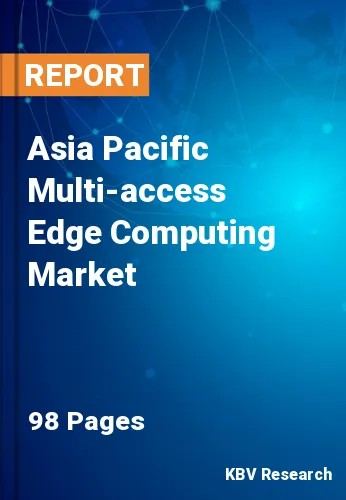The Asia Pacific Multi-access Edge Computing Market would witness market growth of 41.6% CAGR during the forecast period (2021-2027).
Industries such as utility and mining & energy are greatly using multi-access edge computing. Earlier, satellite communications were used as their primary communication medium for offshore mining accompanied by cloud computing and hybrid storage practices for the transfer and processing of data, which led to the loss of resources as well time. This loss of data forced the end-use industries to involve them in efficient communications and storage mediums to examine the large volume of data that is generated commonly at remote locations. The deployment of multi-access edge computing techniques allows users to control sensors and devices from a distant location. The introduction of Industry 4.0 and the capability to control mining processes from distant locations has resulted in rapid automation of processes utilizing various sensors and robots, which is accountable for surging the demand for multi-access edge computing technology.
As multi-access edge computing (MEC) has the capability to bring technology resources closer to the end-user, the demand for this technology is accelerating in Europe. The data is processed and stored at the network’s edge and helps in significantly reducing latency. Multi-access edge computing offers both cloud computing capabilities and the IT service environment, which helps in getting a real-time response. In addition, the European Telecommunications Standards Institute (ETSI) announced the model of multi-access edge computing (MEC) that allows efficient and fast data processing in mobile networks.
In the Asia-Pacific region, demand is growing rapidly for cloud computing and edge computing solutions that can accommodate vast volumes of data and meet low latency requirements. Multi-access Edge Computing (MEC) is a cloud-networking distributed architecture, which allows integration of real-time low latency access with edge servers to better manage latency-dependent applications. MEC is developed to serve mobile, Wi-Fi, and fixed users at the same time by connecting them through dedicated interfaces.
Moreover, in APAC, MEC is moving beyond small-scale & lab environments to early deployments in the past few years. This is especially true where providers are transferring time-sensitive and secure applications from the cloud to the edge for quick response time. For instance, China Telecom completed its smart parking project based on MEC & narrowband IoT. Further, in Taiwan, the city government of Taoyuan has leveraged MEC for a pilot smart streetlight system, with IoT sensors collecting traffic data and road construction information and enable the system to make quick decisions and take actions without any delay. Therefore, this surge in the demand for MEC will further propel the growth of the regional multi-access edge computing market during the forecast period.
The Telecom & IT market dominated the Malaysia Multi-access Edge Computing Market by End-use 2020, thereby, achieving a market value of $91.4 million by 2027. The Data Centers market is estimated to grow at a CAGR of 44.9% during (2021 - 2027). Additionally, The Automotive market is expected to witness a CAGR of 46.9% during (2021 - 2027).
Based on Solution, the market is segmented into Software, Hardware and Services. Based on End User, the market is segmented into Telecom & IT, Data Centers, Automotive, Smart Cities, Smart Homes, & Smart Buildings, Energy & Utilities, and Others. Based on countries, the market is segmented into China, Japan, India, South Korea, Singapore, Malaysia, and Rest of Asia Pacific.
Free Valuable Insights: The Worldwide Multi-access Edge Computing Market is Projected to reach USD 16.7 Billion by 2027, at a CAGR of 39.1%
The market research report covers the analysis of key stake holders of the market. Key companies profiled in the report include Hewlett Packard Enterprise Company, Juniper Networks, Inc., Huawei Technologies Co., Ltd., Amazon.com, Inc., Microsoft Corporation, Adlink Technology, Inc., Advantech Co., Ltd., ZephyrTel, FogHorn Systems and SMART Embedded Computing.
By Solution
By End User
By Country
Our team of dedicated experts can provide you with attractive expansion opportunities for your business.

